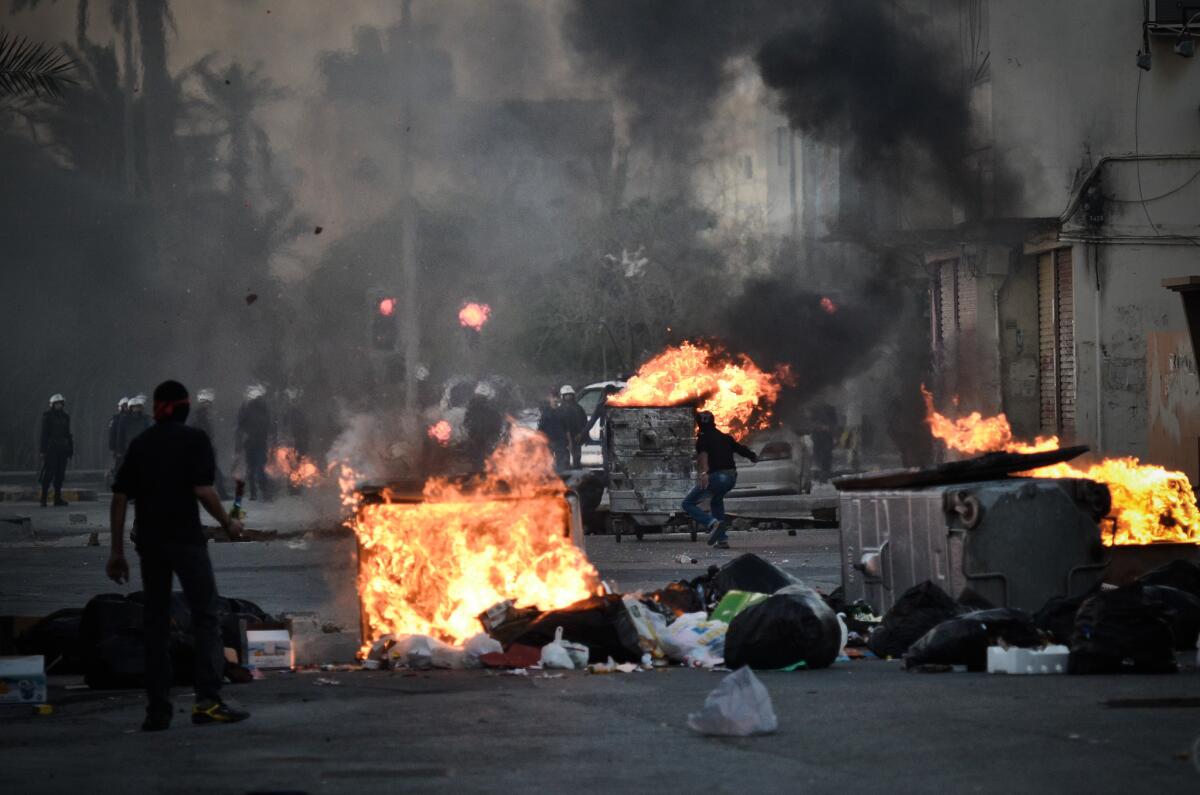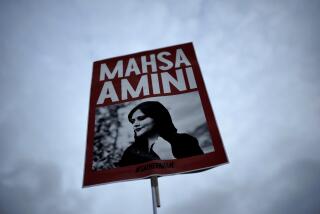Teen killed in Bahrain as protests mark anniversary of uprising

- Share via
Clashes erupted in Bahrain early Thursday, leaving a teenager dead and tensions soaring as protesters marked the second anniversary of the continued uprising against the Persian Gulf monarchy.
Bahraini police said a young man was fatally injured as officers fired birdshot to defend themselves from hundreds of what they termed “rioters” who attacked police with steel rods and Molotov cocktails. Police fired warning shots before shooting, Public Security Chief Tariq Hassan said.
The opposition countered that the youth was the latest victim of “the brutal and inhumane practices” of police against peaceful protesters. Government forces “targeted” the 16-year-old at close range, seriously injuring his stomach, the Wefaq opposition party said in a statement Thursday.
The warring accounts of how the teen lost his life in the village of Daih are the latest sign of the profound divisions roiling Bahrain, where protesters continue to agitate for greater democracy and more political voice for Shiite Muslims in a nation ruled by a Sunni Muslim monarchy.
For protesters, “the situation is exactly where it was two years ago,” said Maryam Khawaja, acting president of the Bahrain Center for Human Rights. “The number of people taking to the streets is massive. And the oppression is continuing in the same way.”
[Updated, 2:50 p.m. Feb. 14: Bahraini police later said that a policeman had also died late Thursday after being hit by a “projectile” shot by rioters in the village of Sehla. The attack is being investigated, the Interior Ministry said in a statement.]
The eruption of demonstrations two years ago was met with rubber bullets, tear gas, torture and arrests. At least 35 people died in connection with the unrest and the ensuing police crackdown over the course of two months, according to an independent report later commissioned by the government. Bahraini activists say scores more were killed by government forces in later months, including 13 children.
The king promised reform after the independent report was released, spurring new training for police, investigations into alleged abuses and other changes. Human rights groups and activists charge that despite talk of progress, torture and repression have continued.
Some police officers have been tried over the killings, but higher officials have not been held accountable, rights groups say. Dissidents have been jailed solely for expressing their views or going to peaceful marches, Amnesty International said Thursday, calling the detainees “prisoners of conscience.”
State officials, in turn, charge that protesters have violently attacked police and sought to destabilize the country. Bahraini officials have accused Iran of stirring up the unrest, despite the fact that the independent report found no evidence that Tehran stoked the protests.
Renewed talks suggest a glimmer of hope: The government launched a national dialogue with the opposition on Sunday, which Wefaq has joined in despite its suspicions.
The dialogue aims “to resolve the political deadlock in Bahrain,” Mariam Zainal of the state Information Affairs Authority wrote in an email to The Times. Government officials, lawmakers and political societies “were all invited to take part with no ceiling on the topics to be discussed regarding political reform.”
However, many activists remain skeptical that the meetings will produce any real change, and some radicalized factions have sworn off any dialogue at all. Chants against the talks were reportedly heard in the streets Thursday. Divisions between Sunnis and Shiites appear to be deepening, one expert warned.
In universities, “Shiites and Sunnis are sitting in different areas in class. Some restaurants are now segregated.… The kind of sectarian language used on Twitter and in chat groups is shocking,” said Geneive Abdo, a fellow in the Stimson Center Middle East program. “Many Bahrainis will tell you there was never this kind of public sectarianism before the uprisings began.”
Government officials heralded Thursday as the anniversary not of the protests, but of the National Action Charter, an earlier blueprint for reform that banned torture and enshrined freedom of belief as a right. The charter was “a turning point in the kingdom’s history that laid the foundation for innumerable positive developments,” Zainal wrote.
However, opposition activists complain those promises were not carried out either -- one reason the 2011 protests were timed for a decade after Bahrainis voted on the charter.
As protests head into their third year, experts say it’s unclear what could turn Bahrain around. Some activists argue the United States could do more to prod its strategic ally toward reform. Khawaja said the U.S. and other powers could halt arms sales to Bahrain and sanction officials implicated in abuses, freezing their assets and banning them from getting visas.
“When the government feels there will be consequences, they might actually stop,” Khawaja said.
Others have suggested the U.S. float the idea of moving the Navy’s 5th Fleet elsewhere in the Gulf. Some are dubious that would work, while others say it just isn’t a realistic possibility, since the U.S. is unlikely to jeopardize any ties to Bahrain while Iran is still seen as a regional threat.
In Washington, “the sense is that maintaining a united political front in the gulf is going to be paramount – and that trumps considerations about democratic reform in Bahrain,” said Charles Dunne, director of the Middle East program at Freedom House, which denounces the crackdown. “We seem to think we need the Bahrainis more than they need us – which is simply not true.”
The stalemate is unlikely to ease unless the Bahraini government makes major changes, Abdo said. Even if it does, “the sectarianism may not evaporate,” she said.
As protests continued to rage Thursday, Wefaq issued a statement saying that “tens” of people were injured by birdshot and grenades. Bahraini police said several officers were also wounded in clashes with protesters, some so severely that they had to be taken to the hospital. An investigation has already been launched into the death of the teenager, said Hassan, the public security chief.
ALSO:
Anger is growing among Iraq’s Sunnis
Oscar Pistorius remains in jail facing murder charge
Iranian general reportedly assassinated while traveling from Syria
More to Read
Sign up for Essential California
The most important California stories and recommendations in your inbox every morning.
You may occasionally receive promotional content from the Los Angeles Times.










